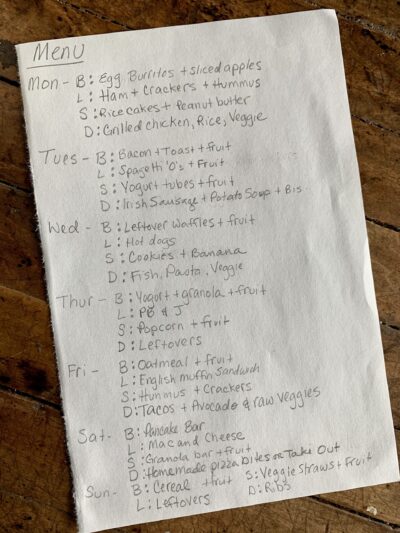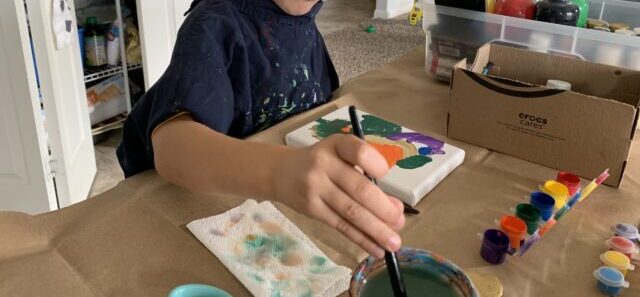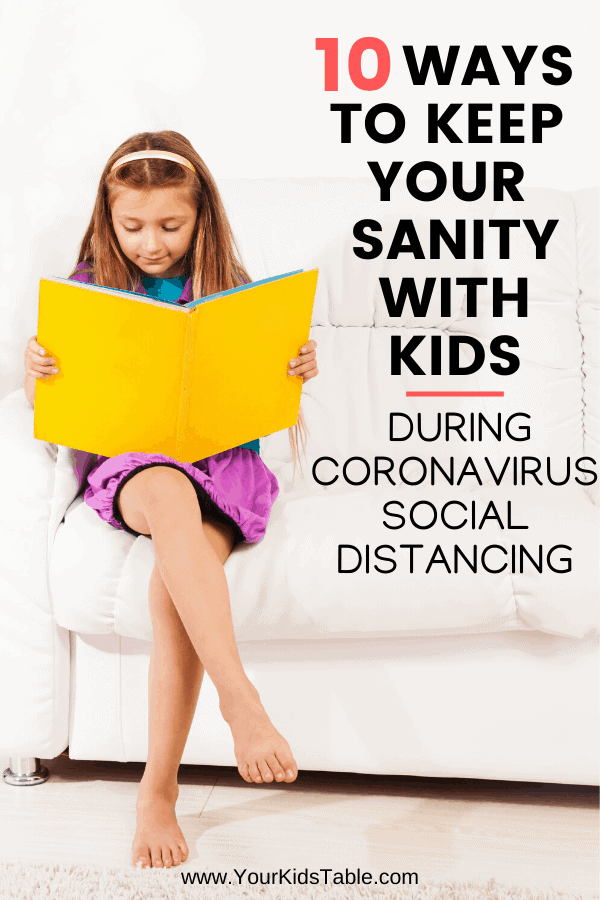Being stuck at home with your kids for an unknown amount of time can cause lots of anxiety, but these 10 tips and activities can help you keep your sanity during Coronavirus Social Distancing.
We are living in an unprecedented time. Never in our modern history have we watched our entire world shut down like a stack of falling dominoes.
But, here we lie with no choice but to accept it.
The CDC is recommending that we all practice social distancing, even those that aren’t at high risk to flatten the curve and stop the spread of the virus.
Nobody in my home is at high risk, but I look at Italy, China, and many other countries right now that are grieving and are faced with painfully difficult decisions because there aren’t enough hospital beds to go around.
I will do my part.
That means a lot of time at home, with three rambunctious children.
That certainly brings it’s own set of challenges, namely maintaining my patience!
Somehow though, beneath the collective and personal worry, I believe that there will be unexpected gifts during this time. If we can shift our focus to look for them.
We could overcome challenges because we have the time to do so. Instead of a million activities and to-do’s pressing in on us.
We might be able to take a breath and grow closer to our kids.
We might be able to help somebody else, beyond the boundaries of our own home.
I can feel the potential for the beauty, grace, and gifts during these times.
As lovely as that all sounds, I know the reality of this situation for most parents, myself included. I don’t want to leave the next few weeks, or months, to chance. On Sunday, I sat at my kitchen table and wrote out what we were going to do to not only withstand this unique time, but to embrace it.
10 Ways to Keep Your Sanity During the Coronavirus Social Distancing
What I ended up writing out was a bunch of different lists. Lists of ideas to keep my kids entertained to avoid, or at least lessen, boredom and fighting during this social distancing.
As I looked back at how I got organized, I realized it was really a mash up of activities, coping skills, and other good practices that I know help children as an occupational therapist.
The truth is I love having my kids home. I want to spend as much time with them as possible. I also love my work here at Your Kid’s Table. The coping skills are necessary to strike the balance, or rather harmony of it all working together.
You might not feel the same way.
That’s okay.
No matter how you feel about your kids being home around the clock, try some of the strategies out so that we can all come through this on the other side being stronger and thankful.
#1: Plan Your Meals
Depending on where you live in the country, getting your hands on a variety of food can be tough right now. Our state just announced all restaurants must close (except for take out). Many grocery store shelves are sparse.
Take inventory of your freezer, fridge, and pantry. You probably forgot about that barley behind the cereal or that extra pulled pork you froze a few months ago.
Write it all down and then sit down and plan out your meals for the next 3, 7, or 14 days.
If your kids are old enough to read, write it out neatly and put it on the fridge. This is the menu plan I wrote out on Sunday:

Why put this on your to-do list? It will save your sanity when your kids starts whining, “What’s for lunch/snack/dinner?”
Instead of begrudgingly saying, “I don’t know yet,” at least that’s how I answer. You can point them to the menu plan on the fridge.
Soon, they’ll learn to look at the menu plan and will stop asking you! Plus, it saves you a ton of time in knowing what you need to have defrosted or pulled out. You’ll use the food you have well and won’t be scrambling to cook at the last minute. Heck, you can even have your kids help or start the meal prep on their own. Here’s some tips for cooking with your kids.
Not to mention, you might even be able to work on some of that picky eating. If you need some recipe inspiration, check out Veggie Recipes for Kids or Picky Eater Meal Ideas.
#2: Set a Routine
How would you like your day to unfold? Or how do you need it to?
If your child has school work to do, when are they the most responsive? When are you available to help them?
Think through these things before you’re faced with a new day. It helps me to actually write it down. Of course, I remember to be flexible too.
Today, I planned on a special family craft together (that might not be your thing) that would take up about 20 min of time, at least. Then, everybody would do their school work, with my assistance, if needed. After lunch, they’d play outside or we’d go hike a trail that gets very low traffic.
It didn’t quite go down like that, what we did got switched around, but that’s okay.
Seems pretty simple, but having some idea will help you avoid giving into excessive screen time, which is oh so tempting.
Screen time can hype a lot of kids up afterwards though. While they’re transfixed staring at the screen, they can go wild when the TV or tablet is finally turned off. As a parent, I’ve made a choice to limit screen time. Yesterday, I had a talk with my kids about screen time and set up some parameters. We decided all school work needed done first. Bedrooms must be clean. Toys must be put away.
Then, I gave some time limits and how often during the week they were allowed. I posted this on the fridge too, since two of my kids can read!
#3: Go Outside
The CDC says it’s safe to let kids play outside, but to avoid playgrounds with equipment that germs can accumulate on. Running around in the backyard, taking a hike on a quiet trail, or riding bikes is a great way for everyone to cope with being home.
Fresh air and being outside is linked to our mental health.
It also keeps kids moving, burning energy, getting their sensory needs met. That means when they come back inside, they’ll be calmer and less likely to fight with each other.
Everybody feels better.
#4: Make a Reading Center
You’ve probably got a lot of books laying around your house. Gather some up. Look for books your kids haven’t seen in a while. Put them in a basket or bin that’s accessible. Some kids will immediately be intrigued just seeing them organized.
If your kid doesn’t show interest, grab a couple books you think they might like and place them in a spot where they’re sure to come across them.
You can also add “Reading Time” to your routine, whether your reading to them or they’re reading or looking at books on their own.
Make sure you rotate the books every week or so. This will help keep them interested.
#5. Listen to Music or a Podcast
Turn on the music, it could just turn into a dance party, which is a great way to connect with your kids, use pent up energy, and calm down.
Also, think about listening to music that’s calming for you while you wash the dishes or take a shower to ground and center yourself. It’s a small thing, but it can break up our routine and get us to focus on something else other than being stuck in the house.
Podcasts are a great option too. Think about podcasts to listen to yourself. Something fun or inspirational. Using Apple’s search feature, you’ll find something that’s perfect for you.
But, podcasts can be great for kids too. Here’s a list of podcasts designed for kids of all ages, but that adults can enjoy to.

#6.Create an Arts and Craft Box
Coloring books, watercolor sets, yarn, and paper are often around the house. You might even have some craft sets your kid got for Christmas and haven’t had time to do yet.
Take an inventory of what you have and make a list or pull them all together in one spot or a box. You can keep your box of crafts out of sight and wisely pull out a particular craft or activity when needed. Or, you can add it to your schedule and lay it out for you kid in advance.
If you have an exploratory child, then you could also give them reign to explore the whole box. Just keep in mind, some kids will get overwhelmed with this and not engage. For other kids, it can keep them busy for hours.
#7. Set Up a Game
You probably have at least a few board games stacked up in a closet. Pull one out and set it up.
Setting the game up is particularly effective if you’ve got a kid that never seems interested in games. Sometimes when we ask kids “What do you want to do,” we’ll just get an “I don’t know.” Or, they’ll ask for a screen. And, if you suggest a game they could say, “I don’t feel like it.” But, when they see it all set up, it immediately draws them in.
Obviously, there’s a ton of benefits to games besides just passing the time. Your kids get a lot of practice learning to take turns, lose, and problem solving skills.
It’s also an excellent way to connect with your kids.
Puzzles you all can work on together is another option.
#8. Write a Letter or Make Pictures for a Relative or Friend
As we have so much time on our hands now, I keep asking myself how we can help others? And, get out of our own heads.
We’re planning on drawing pictures and writing a letter to a local nursing home this week. We’ll also send cards and letters to some family and friends. It’s a great way to work on the kids fine motor skills too while they’re away from school.

#9. Exercise!
If it’s raining or cold and you’re stuck inside, exercise by yourself, with your kids, or both!
Even if you’re not somebody that regularly exercises, now is a wonderful time to start moving your body. As somebody who spent most of their life proclaiming that I hated exercise, I get thinking it’s not worth it.
But, since I started running and walking last summer, I have a totally different perspective.
Exercising is a shot in the arm. We often need it the most when we feel like it the least. There are probably millions of every type of exercise video you could ever want for free on YouTube.
I love Yoga with Adrienne for adults. She’s great for beginners and more advanced yogi’s with hundreds of videos to choose from.
And, Cosmic Kids takes kids through a variety of movements all based around a story. There are tons of themes, scroll through and let your kids pick one out. Most videos run for 10-20 minutes.
#10. Enforce Cleaning Up
Do you ever find yourself cleaning up after your kids because it’s just easier? It starts to get frustrating, or at least it does for me.
Keeping your house tidy (not perfectly clean) can go along way in saving your sanity, but if you’re the one that’s doing most of the clean up, you might have a little meltdown about it at some point.
If you’ve got kids 3 or older, have a talk with them about how you’ll expect them to clean up their toys and keep their bedrooms clean. You can explain that they won’t be allowed to pull out another toy, go outside, or have screen time until their toys/crafts/books are cleaned up.
Then, you’ve got to enforce it.
If my kids try to hoodwink me while I’m busy cooking or working and they say, “Oh, we’ve cleaned up everything.” And, I don’t have a chance to check, then I’ll make them come back inside or stop whatever else their doing and finish cleaning up.
It takes a lot of consistency and repetition, but in the end it’s worth it.
Disorganization and mess can cause feelings of anxiety and irritation.
Get Organized, Make a Routine, + Be Kind to Yourself
As we wrap up this special edition post, I can’t stress enough how important it is to have a rough idea of how you could spend your time. Get organized by making some simple lists with the ideas above and think through a loose routine. Talk to your kids about how the day will go at breakfast or even the day before.
Also, be kind to yourself.
Your human. It’s okay to feel anxious, overwhelmed, angry, or scared during this unprecedented time of social distancing with the coronavirus epidemic.
More Coping Skills for Parents During Coronavirus Social Distancing
Think about other ways beyond creating a schedule, going outdoors, listening to music, and exercising to help you cope.
Journaling, focusing on what you’re thankful for, and reading a good book could all have a big impact on your mental health. You might also have time for a hobby that you used to love, but don’t usually have time for.
Or, a new project?
Maybe you bought an online class a while ago and never got around to taking it?
Or, Maybe you’ve wanted to clean out your linen closet forever?
One thing we have going for us is that we can connect online! We aren’t alone because of the power of the internet. Let us know in the comments how this post helped you and any other ideas you’d like to add to the list…
For more tips and activities, check out The Ultimate Parenting Guide to Thriving During Quarantine.
Additional Resources to Help with Parenting Challenges
The Best Picky Eating Strategy
Free Sensory Diet Workshop (Tools to help your kids with sensory issues and needs)
Fine Motor Obstacle Course to Improve Handwriting
Alisha Grogan is a licensed occupational therapist and founder of Your Kid’s Table. She has over 15 years experience with expertise in sensory processing and feeding development in babies, toddlers, and children. Alisha also has 3 boys of her own at home. Learn more about her here.


Hi Alisha, as an outpatient pediatric occupational therapist, I thank you so much for sharing these tips, tricks, and recommendations. I will definitely be passing this post along to my families as a resource. Thanks again and stay healthy!
Awesome Sam, So happy we can help provide some ideas for your families!
Best,
Desiree
would love to see some hands off tips for those of us who are still working full time with our kids at home.
Great idea, thanks for your feedback Erin!